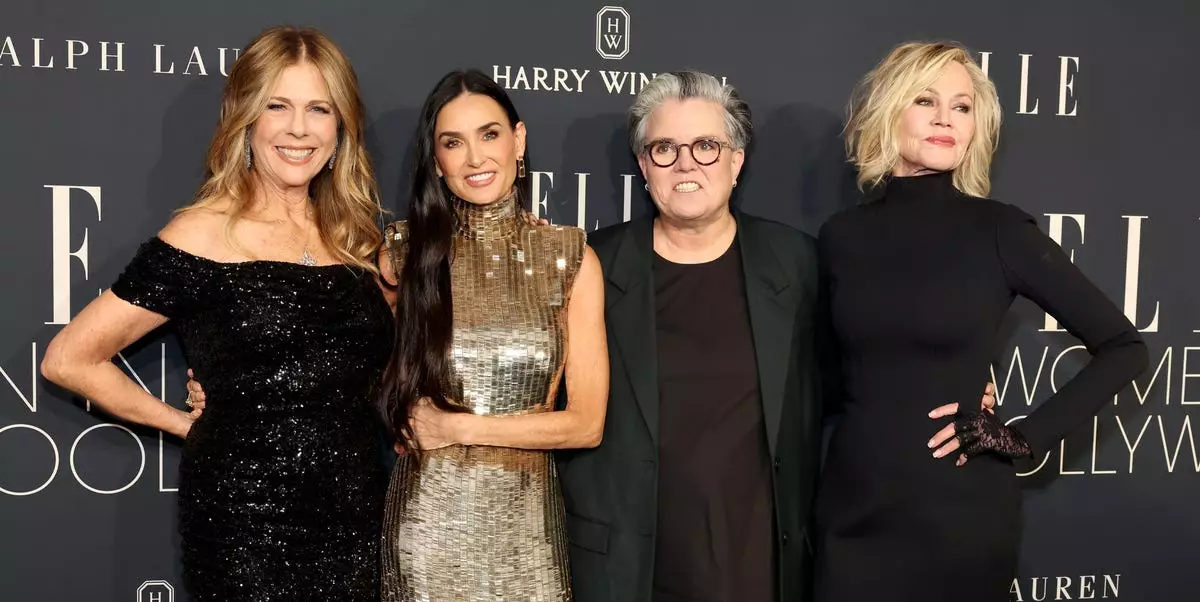The recent Women in Hollywood event hosted by ELLE, in partnership with Ralph Lauren, Harry Winston, and TikTok, served not just as an awards ceremony, but as a poignant reminder of the evolving landscape for women in cinema. Melanie Griffith, Rita Wilson, and Rosie O’Donnell, celebrated figures in Hollywood, came together to honor their friend and collaborator, Demi Moore. Through this purposeful gathering, nostalgia intertwined with empowerment, highlighting significant steps taken by women within the film industry.
The evening was marked by heartfelt reflections on Moore’s significant contributions to cinema, particularly through her performance in “Now and Then,” a film critically lauded for its female-centric narrative. Griffith recounted the pivotal role Moore played not only as an actress but as a producer of the film—an echo of the infrequent but vital representation of women behind the camera during the mid-90s. The remarks from O’Donnell that followed emphasized how rare and special it was to feature “a story about women produced by women, written by a woman, directed by a woman” at that time, positioning Moore as a pioneer in championing female stories on screen.
As the honorees took the stage, the conversation naturally shifted to how much Hollywood standards have transformed since the late 90s. Wilson humorously remarked on Moore’s daring Vanity Fair cover, which captured her in the vulnerable yet bold moment of being seven months pregnant. This statement was juxtaposed against current Hollywood glitz and glamour, implying a softening of boundaries around female bodies in the industry. O’Donnell’s playful quip about embodying Moore’s confidence perfectly illustrated the ongoing tension between public perception and personal agency in Hollywood.
Griffith’s nod toward an infamous quote from “The First Wives Club” about the limited roles available for women in Hollywood provided a critical backdrop for discussing Moore’s extensive career. She has continually defied those narrow categorizations, embodying multifaceted characters that resonate deeply with audiences. With iconic performances in hits like “Ghost” and “A Few Good Men,” Moore offered more than mere box office appeal; she was a reflection of complex female roles in a male-dominated industry. In an era where women’s stories often took a back seat, Moore’s successes marked a significant shift in narrative focus—creating paths for future generations.
As the evening unfolded, Griffith aptly coined the term “Demi-ssance” to describe the current comeback of Moore in both film and public consciousness. This renaissance is not just about rediscovering past successes; it symbolizes a cultural shift toward embracing women at every stage of their careers. The idea of a “Demi-ssance” encapsulates the resilience and re-emergence of women like Moore who continue to push boundaries and defy aging stereotypes in Hollywood.
The emotional weight of the evening was also highlighted by the close connections these women share. Despite the years that have passed since they first starred together, their bond remains palpable. Occasional reunions, like the one they shared at a benefit for the Women’s Cancer Research Fund, serve as a reminder of their shared history and the importance of community among women in Hollywood.
Ultimately, the ELLE event marked not only a celebration of accomplishments but also a call to action. It reminded attendees of the vital role women play in shaping narratives, both behind and in front of the camera, further emphasizing the essential need for continued support, representation, and collaboration in an ever-evolving industry.

